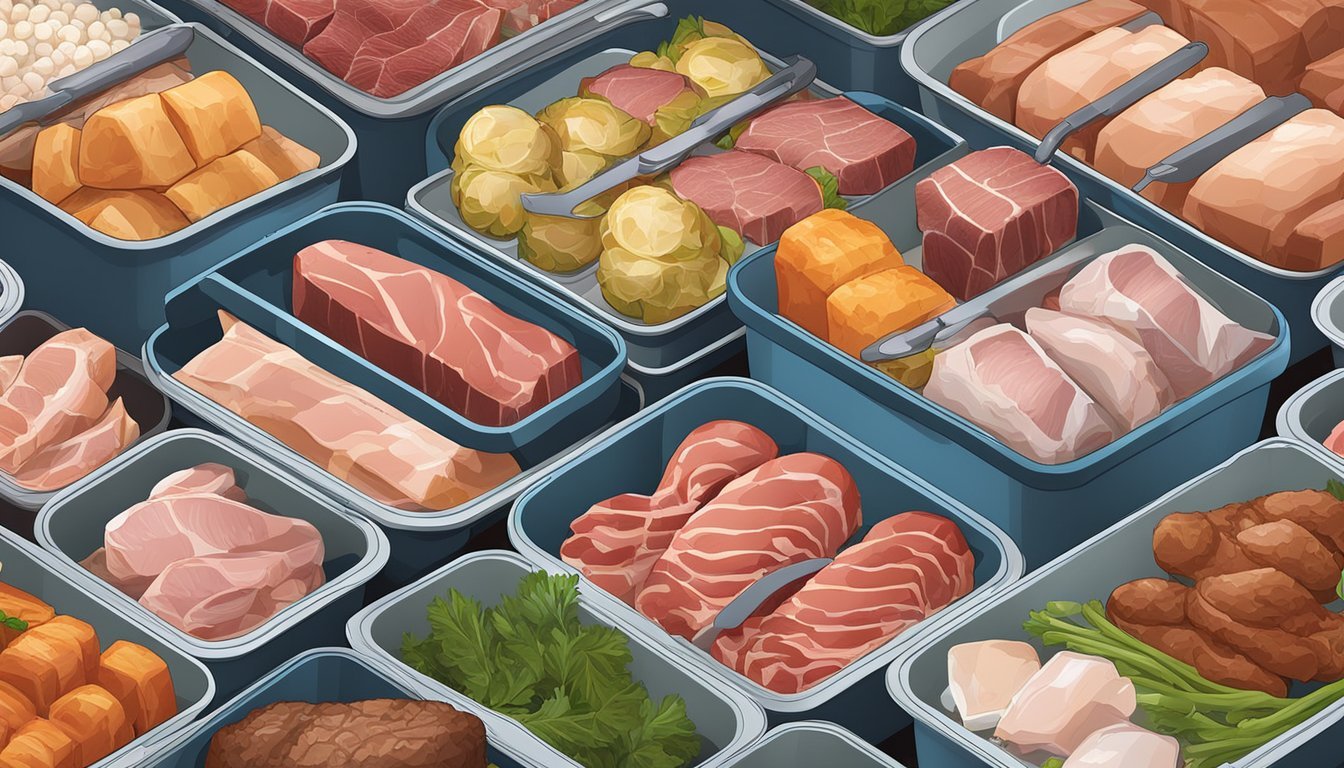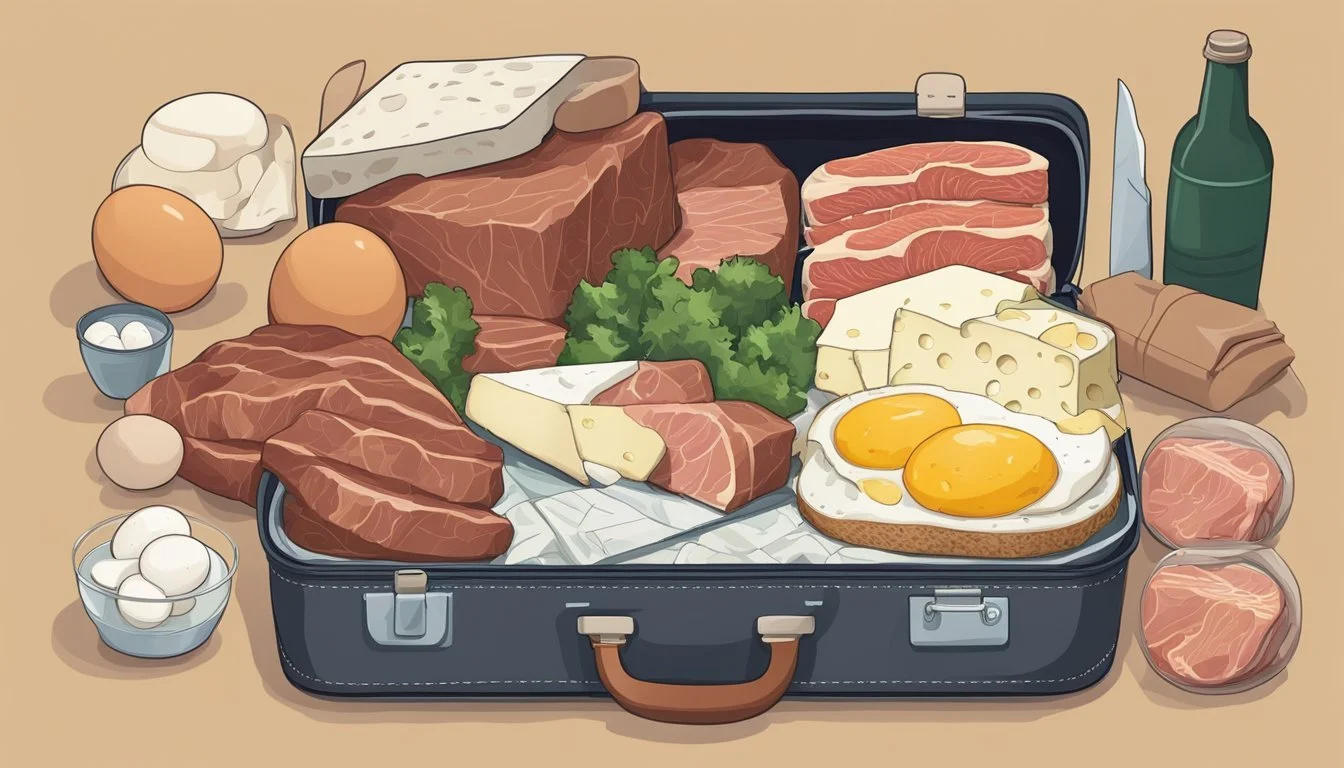The Carnivore Diet for Travelers
Tips for Adhering While Adventuring
Adhering to a carnivore diet during travel presents a unique set of challenges. This diet, which focuses exclusively on animal products, requires careful planning and commitment to maintain while away from the familiar settings of home. Travelers on a carnivore diet need to navigate through limited food options at airports, in-flight meals, and the availability of appropriate foods at their destinations while still ensuring they consume enough nutrients to sustain their health and energy.
Maintaining a balanced intake of macronutrients is imperative for those following a carnivore diet on the go. This entails locating sources of high-quality protein such as meats and seafood, while also ensuring consumption of animal fats for energy, given the absence of carbohydrates in this diet regime. Attention to hydration is crucial due to the high protein nature of the diet, as proper fluid intake aids in digestion and overall bodily functions.
For the traveling carnivore dieter, it is essential to proactively identify places where they can procure the necessary foods. In locations where this diet is less common, carnivore travelers may need to visit grocery stores for raw materials or seek out restaurants that cater to their dietary needs. The key to success lies in preparation and flexibility, as the ability to find suitable food sources and adapt to available options is indispensable for staying committed to the carnivore diet while traveling.
Understanding the Carnivore Diet
The carnivore diet focuses on consuming animal products exclusively, emphasizing high protein and fat intake while eliminating carbohydrates.
Core Principles and Foods
The core principle of the carnivore diet is to consume animal foods exclusively, leading to a dietary pattern that is high in protein and fats while being nearly zero in carbohydrates. The diet includes an array of meats such as steak, poultry, organ meats, and seafood.
Meats: beef, lamb, pork, chicken, turkey, and others
Seafood: fish, shellfish
Animal Fats: tallow, lard
Dairy (for some individuals): hard cheeses, butter
Eggs: whole eggs are often included
The goal is eating until satiated, focusing on fatty cuts to obtain enough energy, given the absence of carbs.
I always prefer buying tallow or lard online because of the added convenience!
Health Benefits and Considerations
Proponents of the carnivore diet claim several health benefits including improved energy levels, mental clarity, and potential weight loss due to its low-carb nature. It is suggested that by eliminating carbohydrates, the body shifts toward utilizing fats for energy, theoretically improving metabolic flexibility and reducing inflammation.
Health Considerations:
Nutrient Density: Meats provide essential nutrients such as B vitamins, iron, and zinc.
Saturated Fat: Opinions on saturated fat intake vary. Some evidence suggests it may not be as harmful as once thought when consumed as part of a low-carb diet.
Fiber: The lack of fibrous plant foods means no dietary fiber intake.
Vitamin C: Traditional sources are excluded, but the requirement may be lower in the absence of carbs.
However, it is important to consult with a healthcare provider before starting any new diet, as individual health needs can vary. Additionally, sustainably sourced and grass-fed animal products are often recommended to maximize the nutritional profile of the consumed meats.
Planning and Preparation
In the journey of adhering to a carnivore diet while traveling, a traveler's success often hinges on meticulous planning and preparation. This section outlines how to create an actionable meal plan, what essentials to pack, and strategies for nutrition and hydration to support dietary goals and restrictions.
Creating a Meal Plan
For travelers on the carnivore diet, a detailed meal plan is the cornerstone of staying committed. It should revolve around high-quality, easily accessible animal products and account for the trip's duration, destinations, and available resources. Planning involves:
Day-wise Meals: Assign specific meats or seafood to each mealtime.
Variety: Include different protein sources to prevent monotony.
Here's a basic template:
Day 1
Breakfast: Canned sardines
Lunch: Beef jerky
Dinner: Steak (dining out)
Day 2
Breakfast: Hard-boiled eggs
Lunch: Smoked salmon
Dinner: Pork chops (What wine goes well with pork chops?) (hotel kitchenette)
What to Pack
Preparing a pack list ensures the traveler has all they need to execute their meal plan. Some staples include:
Non-perishable Protein: Jerky, canned fish (e.g., sardines, tuna), or pre-cooked bacon.
Portable Cooking Equipment: A small travel grill or cooker, if applicable.
Eating Utensils: A knife, fork, and portable food container.
Packing should cater to dietary restrictions and the need for high-quality protein sources.
Nutrition and Hydration Strategies
Maintaining nutrition and hydration on the carnivore diet requires deliberate strategies, especially when navigating through unpredictable travel schedules.
Hydration: Always carry a water bottle and consider adding electrolyte supplements to maintain adequate hydration levels.
Supplements: For travelers with specific nutritional goals or who may have limited food variety, quality multivitamins or omega-3 supplements can be beneficial.
By incorporating these practical tips into their travel routine, travelers can ensure they stay on track with their carnivore diet while away from home.
Carnivore Diet On the Go: Eating Strategies
Adhering to a carnivore diet while traveling demands careful planning and strategic choices, whether dining out or needing a quick snack.
Navigating Restaurants and Menus
When dining at a restaurant, travelers on a carnivore diet should focus on meat-based meals, asking specifically for dishes that include steaks, chops, or seafood. It's advisable to inquire about the preparation methods to ensure that sauces and marinades align with the diet's requirements. One could opt for a salad but replace the greens with extra portions of meat or fish. Fast food can be an option if one selects burger patties or grilled chicken without the bun or condiments that contain carbs or sugars.
Request modifications: extra meat, no sides.
Avoid sauces and dressings not compliant with the carnivore diet.
Snacking and Portable Options
For individuals leading a busy lifestyle, portable snacks that align with the carnivore diet are crucial. Good options can include hard-boiled eggs, jerky without added sugars, and low-carb cheese crisps made by baking thin cheese slices. For those who have the ability to do meal prep, pre-cooked meats or even a portable grill can provide on-the-go access to fresh meat appropriate for the diet.
Hard-boiled eggs
Sugar-free jerky
Low-carb cheese crisps
Overcoming Common Challenges
Travelers might face challenges such as limited access to carnivore-friendly foods and the temptations of local cuisine. To overcome this, they should identify local eateries or stores where they can access fresh meat or approved snacks in advance. Carrying a list of acceptable food items can help avoid confusion while shopping or dining out. In addition, staying hydrated is essential to support metabolic processes on this diet.
Challenge Mitigation Tactics:
Research restaurants and stores beforehand.
Maintain a list of diet-approved food items.
Prioritize hydration.
Food Selection for Travelers
When embarking on travel, individuals committed to the carnivore diet must focus on food selections that are portable, non-perishable, and maintain nutritional value. Selecting the right types of meats, dairy, and seafood ensures dietary consistency and enjoyment.
Choosing High-Quality Meats
For travelers on the carnivore diet, high-quality meats are the cornerstone of their nutrition. Choices such as grass-fed beef steaks, pork chops, and lamb are rich in B vitamins and iron, making them satisfying and nutritionally dense options. Pre-cooked meats, like roasted chicken breasts or beef jerky, offer convenience and are easy to pack. When selecting jerky, opt for products with minimal additives to stay true to the diet's principles. Pork rinds can also serve as a crunchy snack that is easily transportable.
Dairy and Eggs: Selecting the Best Options
Dairy products and eggs are excellent sources of protein and fats for those who include them in their carnivore diet. Look for hard cheeses, such as cheddar or gouda, which can travel well and don't require refrigeration for a short period. Eggs can be carried in the form of hard-boiled eggs, providing both convenience and nutrition. When selecting dairy, prioritize full-fat options to keep in line with the diet's goal of low-carb, high-fat intake.
Fish and Seafood for Diversity
Including fish and seafood in your travel diet invites diversity and adds essential omega-3 fatty acids. Canned fish, such as sardines or wild-caught salmon, is portable and has a long shelf-life, making it an excellent travel companion. For an immediate meal with no preparation required, consider smoked salmon packets. These options not only offer variety but also ensure that you consume different types of animal products, thus varying your nutrient intake.
Accommodating Your Diet While Traveling
Maintaining a carnivore diet while traveling presents specific challenges that require advance planning and adaptability. The following subsections provide practical tips and strategies to ensure that dietary commitments are met with ease during travel.
Choosing Accommodations
One key to success is selecting accommodations that cater to your dietary needs. Travelers should prioritize booking places with a kitchen or kitchenette, such as an Airbnb, to facilitate meal prep. The ability to cook fresh meats is essential, allowing for greater flexibility and control over your meals. A refrigerator or cooler should also be considered to store perishables like meat or specialty items you might bring along.
Communicating Dietary Needs
When meal prep is not feasible, effectively communicating dietary needs is crucial, especially in restaurants or social settings. Learn essential phrases in the local language to articulate your diet, and don't hesitate to ask for custom preparations. Carrying a card or mobile app that translates your dietary restrictions can help bridge the language gap and minimize misunderstandings.
Finding Local Support and Communities
Building connections with like-minded individuals can provide invaluable support. Prior to travel, research local support groups or online communities focused on the carnivore diet. These groups can offer practical tips such as where to find the best meat sources and accommodating eateries. Engaging with these communities enhances the travel experience and helps in sustaining dietary commitments amidst unfamiliar environments.
Maintaining Commitment to the Carnivore Diet
For travelers following the carnivore diet, maintaining this way of eating requires foresight and resolve. The key to success lies in dealing with temptations and leveraging related nutritional strategies like keto and fasting to stay on track.
Dealing with Temptation and Setbacks
When following a carnivore diet while traveling, individuals may face the challenge of surrounding temptations and occasional setbacks. Staying disciplined is critical to maintain commitment. This might involve:
Planning Ahead: Packing snacks such as hard cheeses, which are high in B vitamins and can sustain energy, can help fend off hunger and avoid pitfalls.
Setting Clear Goals: Whether it's for weight loss, managing autoimmune diseases, or reducing fat mass, having specific goals can guide one through challenging moments.
Finding Suitable Alternatives: In circumstances where a carnivore option isn't available, one might temporarily shift to a less strict diet such as keto while focusing on high-fat, low-carb foods.
Integrating with Keto and Fasting
Integrating the carnivore diet with other dietary practices like the keto diet and intermittent fasting can provide structure and simplicity, making it easier to maintain this lifestyle.
Keto Adaptations: A carnivore diet is inherently low in carbs and can align well with keto principles, helping travelers stay in ketosis and potentially expedite weight loss.
Intermittent Fasting: This practice complements the simplicity of the carnivore diet and can aid in managing caloric intake. Fasting windows can be planned around travel schedules for convenience.
By employing these strategies, those following the carnivore diet can navigate the challenges of travel without compromising their dietary goals, applying discipline and flexibility to their nutritional approach.
Potential Pitfalls and How to Avoid Them
Travelers on the carnivore diet face specific challenges that may impact their commitment to this dietary lifestyle. By understanding these pitfalls and strategies for avoiding them, individuals can maintain their diet even while on the go.
Common Nutritional Deficiencies
A strict carnivore diet excludes fruits, vegetables, grains, and oils, which can lead to potential nutritional deficiencies. Travelers should be mindful of the following key nutrients typically obtained from non-animal sources:
Vitamins: Vitamin C and some B vitamins are predominantly found in fruits and vegetables.
Minerals: Potassium, Magnesium, and Calcium can be lacking without a varied diet.
Fiber: Essential for digestive health, is absent in animal products.
To counter these deficiencies, travelers can:
Choose nutrient-dense meats: Liver and other organ meats are high in vitamins and minerals.
Supplement selectively: A tailored supplementation plan can help maintain nutrient balance.
Stay hydrated: Drinking water is crucial, especially when fiber intake is low.
Online shopping for vitamin C, vitamin B, potassium, magnesium, calcium, and fiber supplement is the smart choice for a seamless transaction!
Handling Social and Cultural Challenges
Social and cultural settings can pose challenges for those on the carnivore diet, particularly when traditional meals include grains, vegetables, or alcohol. Strategies include:
Communicate dietary needs: Clearly convey food preferences when dining out or as a guest.
Research local cuisine: Identify meat-based dishes and delicacies in advance to ease selection process.
Physical Health Considerations
The carnivore diet may influence certain health factors like inflammation, kidney function, and food allergies. To support physical health whilst traveling, one should:
Monitor kidney function: A high intake of protein can be strenuous on the kidneys. Seek regular health check-ups to ensure kidney health remains uncompromised.
Evaluate inflammation: Some report a decrease in inflammatory symptoms on the carnivore diet due to the elimination of certain food triggers. However, every individual's response is different, and continuous evaluation is necessary.
Be aware of allergies: New environments can introduce unfamiliar allergens. Ensure any dietary changes do not exacerbate known or unknown food allergies.
Carnivore Diet Resources and Conclusion
Traveling on a carnivore diet can be manageable with the right resources and support. This section provides practical information for travelers looking to maintain their diet on the go.
Books, Blogs, and Communities
For those committing to a carnivore lifestyle, a wealth of resources is at their fingertips. Books such as "The Carnivore Diet" by Shawn Baker give in-depth insights into this way of eating, offering tips that are essential during travel. Blogs provide updated content with a range of carnivore-friendly options, meal ideas, and practical advice for staying on track, both at home and away.
Travelers may also find value in joining communities; online forums, social media groups, and local meetups bring like-minded individuals together to share experiences and support each other. Some helpful resources include:
Reddit Community: /r/carnivore
Facebook Groups: The Carnivore Diet Group
Meetup: Local carnivore diet meetups
These communities often share tips on using spices to enhance the flavor of meals responsibly within the confines of the carnivore diet.
Final Thoughts and Encouragement
Maintaining a carnivore diet while traveling requires focus and planning. However, it's important to remember that resources are readily available to make this task easier. One can maintain their dietary commitment with the support of books, blogs, and communities dedicated to the carnivore lifestyle.
For individual success, travelers should seek out carnivore-friendly options and remember that even simple meals can be enjoyable and within dietary guidelines. By leveraging the collective knowledge and support of like-minded individuals in communities, it's entirely possible to travel without compromising on diet.














